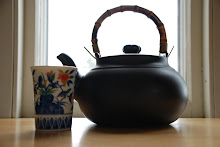
Foiled but not defeated, I resumed my quest for drinkable tea in Philadelphia. It had been a mistake to attempt using the hotel room coffeemaker to boil water, I found. The water did not even reach the tepid mark, and as I was jonesing for my morning cup of Keemun prior to venturing forth into the lecture-hall for the day, I foolhardily steeped a sachet of Tea forte's Earl Grey -carefully packed in my luggage the night before- in this water. Mon dieu, it was truly unpotable. Neither fish nor fowl, it sent me forthwith to the elevators, down to the hotel dining room where within minutes, I was ensconced in a plushy seat with a pot of boiling water and Dammann Freres Gout Russe tea.

This black tea was aptly redolent of a citrusy scent, inspired by the Russian habit of taking tea -usually a strong black one- with orange or lemon slices. My black tea base itself was a melange of various Chinese teas that melded well with the the added orange essence.

Between spoonfuls of warm oatmeal -its spartan nubbiness offset by generous scoops of the now melted brown sugar along with fresh berries- and sips of the pleasing hot tea, I conjured up the harried Olga Mihailovna of Chekhov's wonderful short story, The Name-Day Party. Along with her husband, Olga and her guests set out in canoes across the river to a small peninsula where tables were already laid under the trees; the samovars smoking for tea. Concentrated black tea ( the zavarka), stored in a teapot which sits atop the urn-like samovar, is poured into a teacup or glass when tea is desired. Hot water, from the lower part of the samovar, is then poured from a spigot to dilute the tea before one drinks it.
On the peninsula, "the Island of Good Hope" as it has been monikered, Olga ministers to the whims and needs of her guests as she serves tea, all the while feeling acutely miserable.
While Olga Mihailovna was making the tea and pouring out the first glasses, the visitors were busy with the liqueurs and sweets. Then there was the general commotion usual at picnics over drinking tea, very wearisome and exhausting for the hostess. Grigory and Vasily had hardly had time to take the glasses round before hands were being stretched out to Olga Mihailovna with empty glasses. One wanted tea with no sugar, another wanted it stronger, another weak, a fourth declined another glass. And all this Olga Mihailovna had to remember, and then to call, "Ivan Petrovich, is it without sugar for you?" or, "Gentlemen, which of you wanted it weak?" But the guest who had asked for weak tea , or no sugar, had by now forgotten it, and, absorbed in agreable conversation, took the first glass that came. Depressed-looking figures wandered like shadows at a little distance from the table, pretending to look for mushrooms in the grass, or reading the labels on the boxes- these were those for whom there were no glasses. ......But she felt ill... She was irritated by the crowd of people, the laughter, the questions, the young wag, the footmen harassed and run off their legs, the children who hung round the table..... She felt that her smile of forced affability was passing into an expression of anger, and she felt every minute as though she would burst into tears.
I finished my tea and walked out into a fluttery pink world of blossoming spring, wishing that tea could have brought more joy to my Chekhovian heroine.





No comments:
Post a Comment